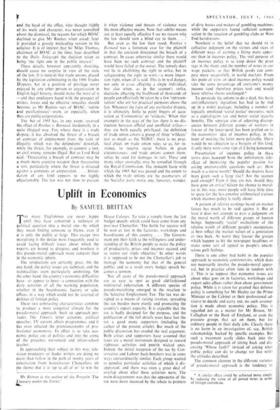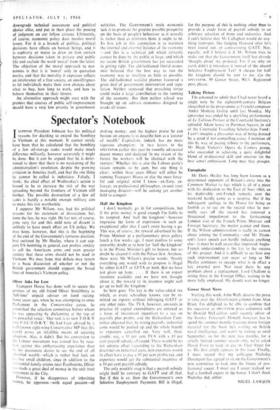Uplift in Economics
By SAMUEL BRITTAN
many Englishmen are never happy until they have converted a technical or political question into a moral one—by which they mean finding someone to blame, even if it is only the public at large. This escape into moralising is the device most frequently used to avoid facing difficult issues about which the experts are bound to disagree; and nowhere is this pseudo-moral approach more rampant than in the economic sphere.
The temptations are certainly great. On the one hand, the policy issues are technical, and the technicalities seem particularly uninviting. On the other hand. the country's economic difficulties have—or appear to have—a connection with the daily activities of all the working population, whether in the boardrooms, factory or sales offices, in a way which could not be asserted of defence of foreign policy.
These two contrasting characteristics combine to produce a most congenial climate for the pseudo-moral approach. Such an approach per- vades The Times's letter columns, political speeches. TV current affairs programmes, and it has even infected the pronouncements of pro- fessional economists. Its effect is to take eco- nomic policy out of politics and into the arena of the preacher, nursemaid and infant-school teacher.
In approaching their subject in this way, tele- vision producers or leader writers are doing no more than follow in the path of twenty years of exhortation from housemaster Chancellors on the theme that it is `up to all of us' to win the
Mr Britian is the author-of the Penguin 'The forteasury under the Tories.'
House Colours. To take a sample from the last budget speech, which could have come from any post-war Chancellor. 'The battle for success will be won or lost in the factories, workshops and boardrooms of this country. . . . The Govern- ment pin their faith to the willingness and under- standing of the British people to make the policy of productivity, prices and incomes succeed and so secure our triple objective.' In other words it is supposed to be not the Chancellor's job to manage the economy but that of the general public; and as a result every budget speech be- comes a sermon.
Not all cases of the pseudo-moral approach are as easy to spot as good old-fashioned ministerial exhortation. A different species of pseudo-moralising emerged in the reaction to the Selective Employment Tax. The tax was de- signed as a means of raising revenue, spreading the tax burden more evenly and promoting the country's export capacity. It is arguable that the tax is badly designed for the purpose, and the publication of the full details must have lost the tax a good many supporters (including the author of the present article). But much of the public discussion has evaded the real argument. Both critics and supporters have assumed that taxes are a moral instrument designed to reward righteous activities and punish wicked ones. Indeed, the initial reception of the tax by Con- servative and Labour back-benchers was in some ways extraordinarily similar. Each group wanted to penalise particular activities of which it dis- approved; and there was even a great deal of overlap about what these activities were. The main disagreement was that the opponents of the tax were more incensed by the rebate to printers of dirty books and makers of gambling machines, while the supporters found sufficient compen- sation in the taxation of gambling clubs or West End hairdressers.
Nowhere is the belief that we should sit in collective judgment on the virtues and vices of different ways of earning a living more appar- ent than in incomes policy. The real purpose of an incomes policy is to keep down the price tags in the shops and the number of notes in our wage packets, so that British goods can com- pete more successfully in world markets. From this point of view an ideal incomes policy would take the same percentage off everyone's money income (and therefore prices too) and would leave relative shares unchanged.* To persuade the unions to do a deal, this basic anti-inflationary ingredient has had to be tied up in a wider package. including a number of logically unrelated 'social justice' measures, such as a capital-gains tax and better social security benefits. The separate aim of adjusting discrep- ancies between different groups of workers in favour of the lower-paid, has been grafted on to the economists' idea of incomes policy, in the hope of making the latter more palatable. There would be no objection to a bargain of this kind, if only there were some sign of it being honoured.
Presentation of incomes policy in these terms does however have the unfortunate side- effect of increasing the popular passion for asking unanswerable questions such as: How much is a nurse worth? Should the doctors have been given such a large rise? Are the seamen paid enough? Even if they are not, should they have gone on strike? Given the chance to moral- ise in this way. most people will have little time to spare for the less emotive arithmetical truisms which incomes policy is really about.
A pattern of relative earnings based on market forces has much to be said against it. But at least it does not attempt to pass a judgment on the moral worth of different groups of human beings. Supposedly 'social' evaluations of the relative worth of different people's occupations at best reflect the market values of a generation or two back. At worst they favour the groups which happen to hit the newspaper headlines or make some sort of appeal to people's uncon- scious guilt feelings.
There is one other bad habit in the popular approach to economic controversies, which does not necessarily involve the pseudo-moral appro- val, but in practice often runs in tandem with it. This is to suppose that economic issues are about what goes on in factories, workshops and export sales offices rather than about government policy. While it is taken for granted that defence policy is something for Mr Healey (or the Prime Minister or the Cabinet or their professional ad- visers) to decide and carry out, no such assump- tion is made about economic policy. This is regarded not as a matter for Mr Brown, Mr Callaghan or the Bank of England, or even the pressure groups that act on them, but for ordinary people in their daily jobs. Clearly there is no harm in an investigation of, say, British salesmanship, backed by specific examples. But such a treatment easily slides back into the pseudo-moral approach of sitting back and dis- cussing 'Whose fault?' instead of asking what public policy can do to change (or live with) the attitudes described.
The common element in the different varieties of pseudo-moral approach is the tendency to • A similar effect could be achieved more simply by reducing the value of all pound notes in terms of foreign currencies.
downgrade technical assessment and political choice alike, and put in their place the passing of judgment on our fellow citizens. Ultimately, of course, economic policy does involve moral issues. For it is a branch of politics; political decisions have effects on human beings, and it is sophistry or worse to draw an iron curtain between decisions taken in private and public life and exclude the word 'moral' from the latter. The objection of the moral approach to eco- nomics is that it is 'moral' only in quotation marks, and that the morality it expresses reflects an intolerance of a free society, an unwillingness to let individuals make their own choices about what to buy, how long to work, and how to behave themselves in their leisure.
An alternative approach might start with the premiss that courses of public self-improvement should have a very low priority in government
activities. The Government's main economic task is to promote the greatest possible prosperity on the basis of people's behaviour as it actually is, rather than as ministers think it ought to be. Its first job in this connection is to maintain the internal and external balance of the economy —and this is a technical job which certainly cannot be done by the public at large, and which no recent British government has yet succeeded in getting right. The old-fashioned liberal econo- mist believed that the best way to run the economy was to interfere as little as possible. The old-fashioned socialist planner favoured a great deal of government intervention and regu- lation. Neither supposed that preaching virtue could make a large contribution to the running of the economy. But then neither school was brought up on admass economics designed to evade all issues.































 Previous page
Previous page